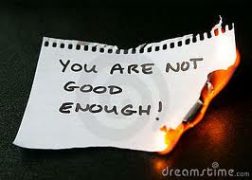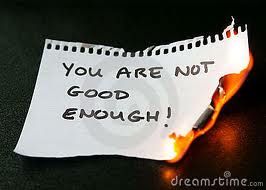
We all want to change before Yom Kippur, but does feeling guilty really help? While healthy guilt can motivate us to clean up our mistakes by taking responsibility for our actions, unhealthy guilt can be paralyzing because of our identification with the mistake and believing there is something wrong with us.
If I believe I am a mistake, I am wrong, I am bad, I’m not good, I’m not worthy, I’m not lovable or I’m not good enough, I will live with tremendous guilt. The more you focus your attention on certain thoughts, the more of them you will get. Thoughts grow with interest and atrophy with disinterest. Getting into the ring with those obsessive, guilty, self-deprecating thoughts will never bring you the relief you are looking for.
They say the definition of doing the same thing over and over again is insanity. Yet that’s what many of us do. We try to change, control or manage our thinking and think that if we somehow get it right, the guilt will go away or we may actually change the behavior. Then we are disappointed when it doesn’t stick.
Deep down we have a vision of who we really are and we feel badly when we don’t live up to it. When we don’t live up to it over and over again, the guilt morphs into insecurity, we are plagued by constant thoughts of not being good enough, being a mess up, thinking we are bad at the core. This then becomes the prism through which we see ourselves and how we show up in the world. Then we continue to have evidence to prove how bad we are and we feel even guiltier.
But the truth is that the evidence from our “bad” behavior is based on a false premise: that we are bad, not good enough, and not valuable. This premise is so counter-productive to change.
From a practical perspective, if someone wants to change a behavior that they don’t like and they feel guilty that they keep doing it (i.e.: yelling at their kids, procrastinating their work, insulting or undermining their spouse, disrespecting their parents, cheating in business) does believing you’re really bad and unworthy help motivate you to change or does believing that you are good at your core, that your value is not dependent on anything other than the fact that you were created in the image of G-d help motivate you to change?
I’m not saying we are not responsible for our actions or accountable for our actions, but I am saying that the key to change is in knowing who we really are – knowing we are good at our core, learning to love and accept our human frailties.
Most of our suffering comes from the belief that I think I should be somewhere I’m not. The guilt is in the gap between who I think I should be and how I am showing up in the world. The only way to change is acceptance of that gap, acceptance of your humanity.
Yet, we feel compelled to indulge in beating ourselves up, innocently believing that somehow that harshness and judgment is going to help us change. We can’t change in a hostile, negative environment.
Imagine a child who makes a mistake, even a big one, and the adults around him (parents, teachers, friends start screaming at him, hitting him, berating him)…would anyone expect him to bounce back and get back in the game. Although we are always resilient, we can help create an environment that makes it easier to bounce back. Yet we don’t create this environment for ourselves, buying the false belief that if I don’t beat myself up enough then nothing will change.
Most people have a hard time believing they are good and worthy, yet G-d has unending belief in our goodness. Every morning we wake up and say modei ani, I give thanks before the living and eternal King who returns to me my soul, and then we say b’chemla rabbah emunasecha – with compassion Your faith is abundant. G-d, Your belief in me is abundantly compassionate, so who am I to not believe in myself?
Let’s work on believing in ourselves, arousing compassion from within. Let the strategy for removing unhealthy guilt be an inside out job rather than an outside in job. Teshuva is returning to your true self, which means returning to who you truly are as Hashem sees you.
Find time every day to focus on who you are, believing in your own goodness, finding it in yourself to accept yourself and forgive yourself. Awaken to the truth that you are not your mistakes, you just may make mistakes, but your value is not dependent on that. You don’t need to be perfect to be valuable. No matter how many mistakes you make, they do not detract from your intrinsic value. I don’t know how to make you believe that, but I do know that in a way a man wants to go he will be led, so all you need is a will, a desire to want to believe in yourself.
Express your desire and let Hashem do the rest. Removing the guilt, awakening acceptance and compassion, that’s in His hands. All you have to do is want it. Want to believe in your goodness and value and return to Him and your true self.
May our efforts be blessed and may we be sealed for a year of health, clarity, blessings, growth, livelihood, menuchas hanefesh, peace and a tangible feeling of closeness to Hashem.



nicely expressed..but i wouldn’t expect otherwise!
gmar chasima tova
thank you so much.
So beautifully written and meaningful. Thank you, Aviva!